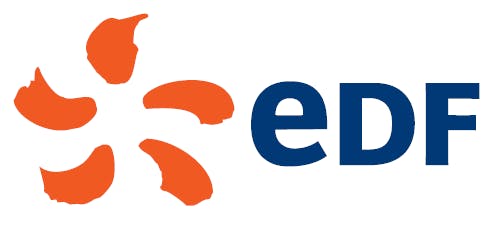One of the main areas of focus in 2020 was the position of the employees of. providers. The best offer criteria have been reviewed and their inclusion in contracts has increased significantly. All companies submitting a bid must now provide a health and safety self-assessment, otherwise their bid will not be admissible. In addition to the initiatives already implemented by the Group’s entities and subsidiaries, a working group representing around 20 providers was set up in November 2020 at the Group level to define shared measures for improvement. A survey was also launched in December 2020 to obtain direct feedback from employees of providers working in the field.
Reducing work-related accidents
In order to have comparable data between Group entities and measure accident rates directly related to the performance of activities, EDF set-up a new “LTIR” indicator corresponding to the calculation of the frequency rate according to Anglo-Saxon standards. This indicator has been monitored since 2017 and disclosed since 2019.
The 2020 goals of the health and safety policy are now expressed on the basis of this new indicator (EDF LTIR below 1.4 and global LTIR: EDF + providers below 1.8). Overall, the various LTIRs have improved, enabling the Group to achieve the goals set in the health and safety policy. The increased use of remote working arrangements during the health crisis led to a significant reduction in same-level falls (and therefore the LTIR), particularly for EDF group employees(1).
Global LTIR (employees + providers)

2019 : 2.4
2020 : 1.9
Target 2020 : < 1.8
Key non-financial performance indicator
The methodology for this indicator is set out in detail in section 3.7.2.2 "Details on performance indicators".
Further details on work-related accidents and occupational illnesses(2)
| EDF group | Unit | 2018 | 2019 | 2020 |
|---|---|---|---|---|
| LTIR Group employees | LTIR Group employees Unit
| LTIR Group employees 2018 2.0 | LTIR Group employees 2019 1.8 | LTIR Group employees 2020 1.4 |
| Employee work-related accidents with at least one lost day | Employee work-related accidents with at least one lost day Unit Number | Employee work-related accidents with at least one lost day 2018 667 | Employee work-related accidents with at least one lost day 2019 434 | Employee work-related accidents with at least one lost day 2020 351 |
| Accident severity rate | Accident severity rate Unit
| Accident severity rate 2018 0.13 | Accident severity rate 2019 0.14 | Accident severity rate 2020 0.13 |
| Occupational illnesses | Occupational illnesses Unit Number | Occupational illnesses 2018 nd | Occupational illnesses 2019 63 | Occupational illnesses 2020 41 |
The drop in occupational illnesses over the past few years follows a drop in the number of reported asbestos-related illnesses, confirming the success of the prevention and protection measures implemented within the Company.
3.3.1.3.3 Well-being and psychosocial risks
Combating absenteeism, preventing psychosocial risks and improving well-being at work
Among the crucial areas for improvement, prevention of anxiety- and depression-related disorders, stress and musculoskeletal disorders (MSD), the three main causes of absenteeism, are regularly targeted by prevention initiatives.
The development of team empowerment projects led to a significant drop in absenteeism among the employees of the teams involved, due to the positive health impacts of the improved quality of life in the Groups and the increased levels of commitment and meaningfulness of work.
| 2018 | 2019 | 2020 | |
|---|---|---|---|
| Number of days of absence per employee per year | Number of days of absence per employee per year 20189.1 | Number of days of absence per employee per year 20199.1 | Number of days of absence per employee per year 20208.8 |
Health in the workplace and general health issues
The EDF group employs staff specialised in health at work. The Group also employs physicians who are experts in toxicology, ergonomics, epidemiology, first aid, and radiation protection. In addition to medical monitoring of employees, these healthcare workers are involved in setting up primary prevention programmes and are stakeholders on all the social dialogue bodies in the field of health at work, thus reducing absenteeism and occupational illnesses.
With the support of its medical teams and the safety officers at its entities, the EDF group is also committed to public health issues such as addiction and cardiovascular risk prevention. In 2020, the EDF group became involved in the “1 Moi(s) sanstabac” anti-smoking campaign run by Santé publique France (French Public Health Agency) and decided to sign up for the national “Les Employeurs pour la santé” employer health promotion campaign. These initiatives help motivate employees with the support of the Company’s health and safety network.
As part of the preparations for the 2024 Olympic Games, actively supported by the Group, a project has been launched to enable a group of 28 top-level athletes who support the Group and embody its environmental, social and societal values to be assisted by the TEAM EDF(3). The aim is to develop, in liaison with the medical teams, a positive collective promotion of “Sport for Health”, which is all the more important now, given the health crisis and lockdown.
(1) The 2023 goal is to maintain an LTIR level of less than 1.8.
(2) The methodology associated with this indicator is explained in section 3.7.2.3 “Further details on other environmental, social and societal data included in the non-financial performance statement”.
